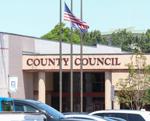GREENVILLE — Days after a group of local state legislators sued Greenville County Council for what they say was illegal adoption of a budget that raised taxes for the first time in three decades, the council’s chairman has spoken out, calling the suit more about politics than legality.
Council Chairman Dan Tripp’s response came in the form of a prepared statement issued Aug. 24 on the lawsuit filed Aug. 21.
“This is a political disagreement masquerading as a lawsuit,” Tripp said in the statement. “The County carefully followed the prescribed laws and rules in approving by a supermajority of votes its budgets. We will vigorously defend the integrity and lawfulness of our budget process.”
The lawsuit was filed on behalf of Greenville-area legislators — State Sen. Dwight Loftis and Reps. Mike Burns, Patrick Haddon, Adam Morgan, Alan Morgan and Ashley Trantham. The Simpsonville-based South Carolina Public Interest Foundation is also a plaintiff.
The dispute centers on how the council approves county budgets on a two-year cycle instead of annually and whether the county did so with proper public involvement, including an allegation of a “secret meeting.”

The council’s final vote to raise taxes among a raucous crowd July 18 was the culmination of weeks of on-the-brink political maneuvering. Having not increased taxes in 30 years, the issue became in large part an avatar for the larger public debate over federal spending.
The tax increase amounts to $56 more on the bill for a $200,000 single-family home.
The 8-4 vote met the requirement of a supermajority to raise taxes.

The suit alleges a quorum of the council met June 6 in a closed-door meeting that was not announced to the public to discuss the budget. Such a meeting would be in violation of the state’s Freedom of Information Act.
“At that meeting a poll took place about the pending votes and efforts were made to encourage councilors to support the budget,” the complaint states. “With a quorum present this should have been publicly announced, open to the public, and minutes of that meeting should have been taken.”
The approved tax increase was less than what was originally proposed. The suit alleges that the public wasn’t properly notified of the significant changes being negotiated.

The county passes budgets for a two-year cycle, a process the suit claims violates state law that requires a new spending plan be approved one year at a time. The suit alleges the county has used this system since 2008 and is the only county in South Carolina to do so.
During debate over the budget, council members against a tax increase employed multiple political moves — including one failed proposal that property owners be able to opt out of taxes on services they don’t use and that the council wait until March 2024 to consider the second year as it will have more information about finances.
After stalling on a 6-6 vote, the council in June voted 8-4 consider only the coming year’s budget, which allowed negotiation in the ensuing weeks to approve the second year.
Reporter Conor Hughes contributed